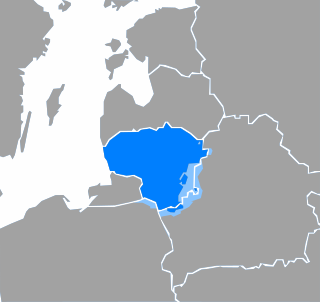
The Sudeten German Party was created by Konrad Henlein under the name Sudetendeutsche Heimatfront on 1 October 1933, some months after the First Czechoslovak Republic had outlawed the German National Socialist Workers' Party. In April 1935, the party was renamed Sudetendeutsche Partei following a mandatory demand of the Czechoslovak government. The name was officially changed to Sudeten German and Carpathian German Party in November 1935.
Memel Workers Party was a communist organisation in the Memel Territory in 1925-1935. The party was founded in 1925. Hermann Suhrau and Adolf Monien served as chairmen of the party. The party was primarily supported by agricultural workers.

Parliamentary elections were held in Czechoslovakia on 27 October 1929. The result was a victory for the Republican Party of Farmers and Peasants, which won 46 seats in the Chamber of Deputies and 24 seats in the Senate. Voter turnout was 90.2% in the Chamber election and 78.8% for the Senate.
The German Electoral Coalition was a political alliance in Czechoslovakia representing Sudeten Germans.
Hermann Suhrau (1898–1947) was a German politician. Suhrau was born on 25 April 1898 in Memel, East Prussia. He was a wood- and construction worker. He was a workers' leader in inter-war Memel.
Karl Buchwald was a German politician and trade unionist.
Karl Čermak was a German socialist politician. A skilled organizer, Čermak emerged as a key leader of the labour movement in German Bohemia in the years preceding World War I. He went on to become a parliamentarian in the First Czechoslovak Republic.

The Nové Zámky 16th electoral district was a parliamentary constituency in the First Czechoslovak Republic for elections to the Chamber of Deputies. The seat of the District Electoral Commission was in the town of Nové Zámky. The constituency elected 11 members of the Chamber of Deputies.
Adolf Plennis was a Memel German politician.
The German People's Group in Czecho-Slovakia was a German minority political party in the Second Czechoslovak Republic from October 30, 1938 to March 1939.

The Carpathian German Party was a political party in Czechoslovakia, active amongst the Carpathian German minority of Slovakia and Subcarpathian Rus'. It began as a bourgeois centrist party, but after teaming up with the Sudeten German Party in 1933 it developed in a National Socialist orientation.

Franz Karmasin was an ethnic German politician in Czechoslovakia, who helped found the Carpathian German Party. During World War II he was state secretary of German affairs in the Slovak Republic, and rose to the rank of SS-Sturmbannführer. Tried in absentia and sentenced to death, he fled to West Germany where until his death he was active in the Witikobund, a right-wing extremist organization that claimed to represent Sudeten Germans.

The Jihlava 10th electoral district was a parliamentary constituency in the First Czechoslovak Republic for elections to the Chamber of Deputies. The seat of the District Electoral Commission was in the town of Jihlava. The constituency elected 9 members of the Chamber of Deputies.
The German Party was a National Socialist political party active amongst the German minority in Slovakia from 1938 to 1945.
Josef Steinhübl (1902–1984) was a German politician and Catholic priest.
Sudetendeutscher Landbund was a Sudeten German political party in interwar Czechoslovakia. The party was founded in 1928, following a split in the Farmers' League. The founding party congress was held in Brno on 25 March 1928. The founders of SdLB had constituted the völkisch wing of the Farmers' League. SdLB was a German nationalist farmers party, opposed to Czechoslovak statehood. Georg Hanreich and Josef Mayer served as chairmen of the party.
Heinrich Buttkereit (1884–1947) was an ethnic German politician in Lithuania. Buttkereit was born on April 23, 1884 in Ruß. He was a farmer from Ruß. In the 1932 election to the parliament of the Klaipėda Region, he stood as candidate number 26 on the list of the Memel Agricultural Party. He was not elected in 1932, but on September 13, 1934 he filled one of seats in the assembly that had been left vacant. He remained a member of the regional parliament until the 1935 elections.
The Social Democratic Party of the Memel Territory was a social democratic political party in the Memel Territory/Klaipėda Region 1925–1935. The party was led by August Kislat and Fritz Matzies. The party was based amongst the ethnic German population of the territory.
Karl Kreibich was an ethnic German politician in the First Czechoslovak Republic. Kreibich was born in Bratislava on August 21, 1867. He worked as wholesale trader in Bratislava. On February 21, 1933, he replaced Rudolf Böhm as Senator in the Czechoslovak National Assembly, following Böhm's death. He represented the German section of the Provincial Christian-Socialist Party in the Senate. Kreibich's Senate mandate ended in 1935.
Rudolf Böhm was an ethnic German politician and businessman in the First Czechoslovak Republic. Böhm was born in Spiš on August 6, 1884. From the early 1920s, he was part of the Provincial Christian-Socialist Party leadership in Bratislava. He stood as candidate for the Senate in the Czechoslovak parliamentary election, 1925. He was elected to the Senate in the Czechoslovak parliamentary election, 1929. He died on January 19, 1933.












